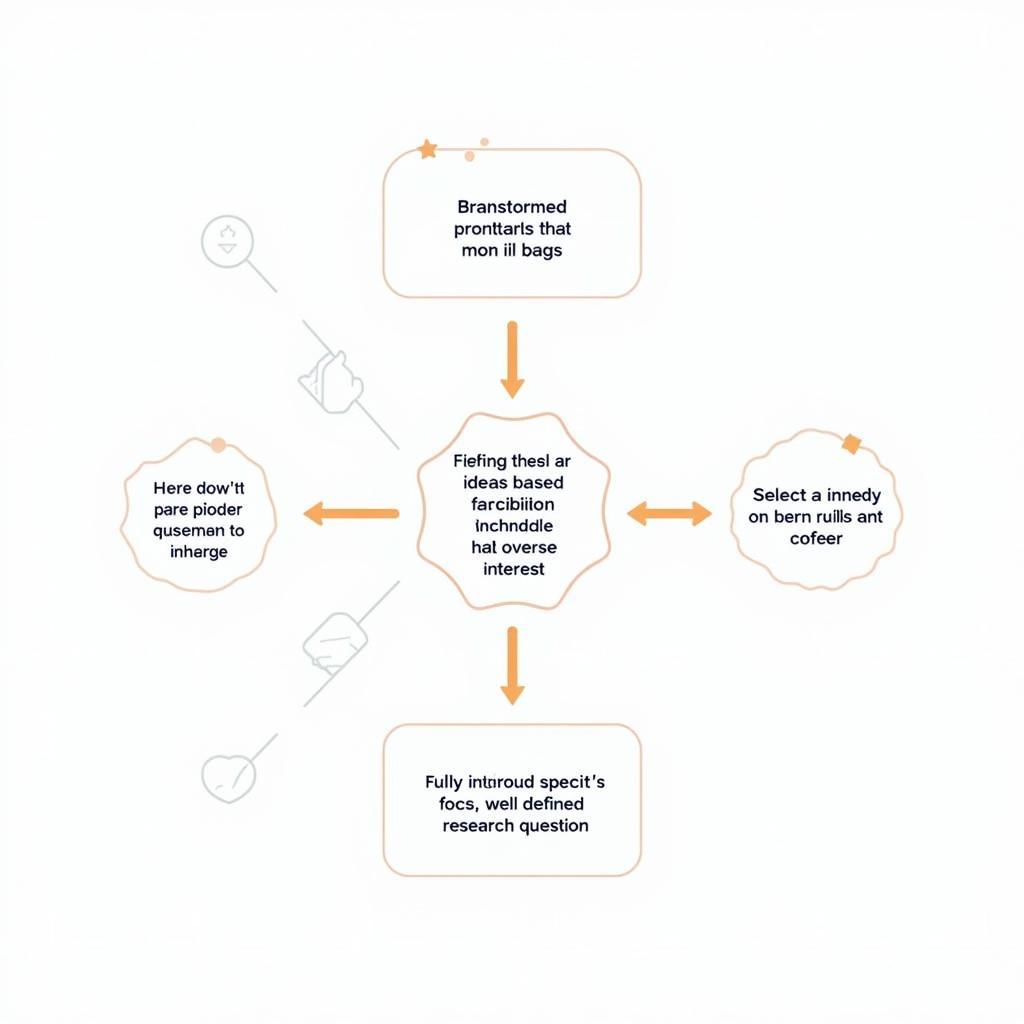Choosing the right research topic is crucial for a successful project. It sets the foundation for your entire research endeavor, impacting everything from your motivation to the quality of your findings. Whether you’re investigating the mysteries of the paranormal or exploring a more traditional field, selecting a viable topic is your first step towards compelling discoveries.
 The process of selecting a research topic, involving brainstorming, refining, and focusing.
The process of selecting a research topic, involving brainstorming, refining, and focusing.
Finding Your Focus: Narrowing Down Your Research Topic
One of the biggest challenges in research is narrowing down your interests into a manageable and meaningful topic. A topic that’s too broad can lead to superficial research, while a topic that’s too narrow may lack sufficient resources. Think about the paranormal, for example. “Ghosts” is far too broad. “The reported hauntings of Gettysburg, Pennsylvania, and their correlation with historical battles” is much more focused and researchable.
What if you’re struggling to even come up with an initial idea? Try exploring current events, reviewing existing literature, or discussing potential topics with colleagues or mentors. For researchers interested in exploring qualitative methods, resources like the ones available on qualitative inquiry and research design can be invaluable.
Evaluating Feasibility: Can You Actually Research This?
Once you have a few potential topics in mind, assess their feasibility. Consider factors like access to information, available resources, and the time frame for your project. If you’re investigating a specific type of paranormal activity, are there documented cases available for study? If you need specialized equipment, is it accessible?
How to Select a Research Topic that Sparks Your Interest
Research can be demanding, so choosing a topic that genuinely interests you is vital for maintaining momentum and producing high-quality work. Your passion will fuel your perseverance and drive you to delve deeper into your chosen area. Even within a specialized field like Paranormal Research, there are endless fascinating subtopics to explore, from EVP analysis to psychic phenomena. The key is to find the one that truly captivates you.
Aligning with Your Resources: Making the Most of What You Have
Selecting a research topic should also involve a careful consideration of your existing resources. These resources can include funding, access to specific datasets, or even your own expertise. Perhaps you have a background in psychology; this could be a valuable asset when researching the psychological impact of alleged paranormal experiences. Understanding your resources helps you select a topic that you can realistically tackle. There are excellent tools available now, like those discussed in articles about the best AI for research, that can significantly enhance your research capabilities.
Refining Your Research Question: Getting Specific
Once you have a general topic area, refine it into a specific research question. This question should be clear, concise, and focused. For instance, instead of “paranormal investigation,” your question might be “How do environmental factors influence reported paranormal activity in historic houses?” This refined question provides direction and helps you stay focused throughout your research. When navigating the complexities of academic research, understanding different literature review types can be especially beneficial. Resources like those found on different types of literature reviews in research can provide valuable guidance.
“A well-defined research question is the compass that guides a successful research journey,” says Dr. Evelyn Reed, a leading paranormal investigator. “Without it, you risk getting lost in a sea of information.”
Another expert, Professor Arthur Finch, adds, “The right research topic should challenge you intellectually while also allowing you to contribute meaningfully to your field.” Ethical considerations are paramount in any research endeavor, particularly in sensitive areas like psychology. Understanding how to prevent ethical abuse in psychology research is essential for all researchers in this field.
In conclusion, How To Select A Research Topic involves careful consideration of your interests, available resources, and the feasibility of the project. By narrowing your focus, refining your research question, and aligning your topic with your resources, you can set yourself up for a successful and rewarding research experience.
FAQ
- What if I can’t find enough information on my chosen topic?
- How do I know if my research question is too broad or too narrow?
- What are some good resources for finding research topics?
- How important is it to choose a topic I’m passionate about?
- What should I do if my research takes me in an unexpected direction?
- Can I change my research topic midway through my project?
- How can I ensure the ethical integrity of my research?
Need support with your research? Contact us 24/7 at Phone Number: 0904826292, Email: research@gmail.com or visit us at No. 31, Alley 142/7, P. Phú Viên, Bồ Đề, Long Biên, Hà Nội, Việt Nam. We are here to help!